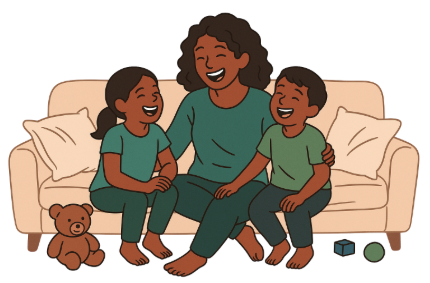When Your Children Don’t Get Along: Supporting Sibling Relationships Without Losing Yourself
- Nada Johnson

- Aug 12, 2025
- 4 min read
Why sibling rivalry can leave you feeling drained, guilty, and wondering if you’re failing as a mom.

They fight over toys.
They fight over space.
They fight over who got more attention, more dessert, more anything.
And you, already juggling a thousand things, are left playing referee, peacemaker, and sometimes even detective.
It’s not just the noise.
It’s the tension. The way your shoulders stay tight hours after the shouting stops. It’s the fear: If they can’t get along now, what will their relationship be like as adults?
At Nada Johnson Consulting & Counselling Services (NJCCS), I work with mothers who feel worn down by their children’s constant conflict, mothers who want harmony in their home without losing themselves in the process.
The Emotional Toll on Mothers
When your children fight often, it’s not just their relationship at stake—it’s your emotional well-being too.
Research shows that frequent sibling conflict can significantly increase parental stress, particularly for mothers, and may contribute to feelings of guilt, frustration, and helplessness (Lindell & Campione-Barr, 2017).

You might notice:
💔 Feeling like you’re “failing” as a mom
💔 Resentment toward one or both children
💔 Emotional exhaustion from constant mediation
💔 Difficulty enjoying family time
💔 Worry about long-term family relationships
And sometimes, the stress lingers even during peaceful moments, because you’re bracing for the next argument.
Why Sibling Conflict Happens

Sibling conflict is common—and, in small doses, even healthy for learning negotiation and empathy. But when it’s constant, it can erode family connections.
Common causes include:
➡️ Competition for parental attention (McHale et al., 2012)
➡️ Jealousy over perceived favouritism
➡️ Personality and temperament differences
➡️ Developmental stages—younger kids may not yet have the skills to manage frustration
➡️ Stressors outside the home—school, friendships, or big life changes
Understanding why the conflict happens can help you respond with less guilt and more strategy.
Supporting Sibling Relationships Without Losing Yourself

You deserve peace too. Supporting your children’s relationship doesn’t mean sacrificing your own well-being.
🌿 Stay neutral – Avoid taking sides in front of your children. This helps prevent feelings of favouritism (Feinberg et al., 2013).
🌿 Set clear rules for respect – Make kindness and personal space non-negotiable. Post them where everyone can see.
🌿 Schedule one-on-one time – Even a short “mom and me” routine with each child can reduce jealousy and increase security.
🌿 Model healthy conflict resolution – Let your children see you handle disagreements calmly and respectfully.
🌿 Protect your energy – Take breaks when tensions run high. You don’t have to resolve every conflict in the moment.
Let Go of the Perfect Family Myth

You are not failing if your children argue. Conflict is a normal part of sibling relationships—it’s how you guide them through it that matters.
Mothers often carry the unspoken expectation to “fix” every family dynamic. But the truth is, you cannot—and should not—do it all alone. Support from a counsellor can help you find balance, protect your mental health, and guide your children toward healthier connections.
NJCCS Is Here for You
At NJCCS, I offer counselling for mothers navigating sibling conflict, jealousy, and family stress. Together, we can create:
🌿 Strategies for reducing tension at home
🌿 Tools for teaching children respectful communication
🌿 Space for you to process your feelings without judgment
🌿 Plans for strengthening the whole family’s emotional health
Because your well-being matters too, and a calmer you can mean a calmer home.
With warmth,

Nada Johnson, MSW, RSW
Registered Social Worker, Psychotherapist / trained Family Mediator / EMDR Trained Therapist / Certified Racial Trauma Clinician / Mental Health & Sexual Violence Consultant / Professional Speaker

🌍 Website: www.nadajohnsonservices.com
📩 Contact: info@nadajohnsonservices.com
Nada Johnson Consulting & Counselling Services – Online phone and video sessions available
Village Healing Centre: 240 Roncesvalles Avenue
Follow our platforms for empowering content, parenting support, and mental health tools. Please share this post to support other mothers raising neurodivergent children; they deserve care too. 🤝
References
Feinberg, M. E., Solmeyer, A. R., & McHale, S. M. (2013). The Third Rail of Family Systems: Sibling Relationships, Mental and Behavioral Health, and Preventive Intervention in Childhood and Adolescence. Clinical Child and Family Psychology Review, 15(1), 43–57. https://doi.org/10.1007/s10567-012-0116-9
Lindell, A. K., & Campione-Barr, N. (2017). The Dark Side of Sibling Relationships: Sibling Rivalry, Aggression, and Bullying. In Siblings in Adolescence (pp. 32–51). Springer.
McHale, S. M., Updegraff, K. A., & Whiteman, S. D. (2012). Sibling Relationships and Influences in Childhood and Adolescence. Journal of Marriage and Family, 74(5), 913–930. https://doi.org/10.1111/j.1741-3737.2012.01011.x

Want More Support for Your Professional & Personal Growth?
🔷Try Potential Unlocked™🔷
In addition to counselling, NJCCS offers coaching through our sister brand, Potential Unlocked™, designed specifically for professional women navigating career, leadership, and life transitions.
We support clients with:
Communication and conflict strategy in the workplace
Career development and leadership coaching
Navigating workplace dynamics and burnout recovery
Building confidence in both personal and professional relationships (Online dating empowerment coaching, because personal growth impacts professional life too!)
👉 Visit www.potentialunlocked.ca to learn more or book a free 10-minute consultation call.




Comments